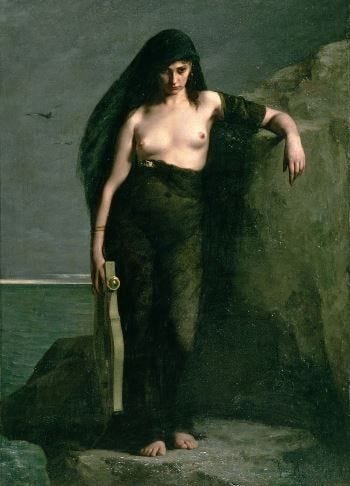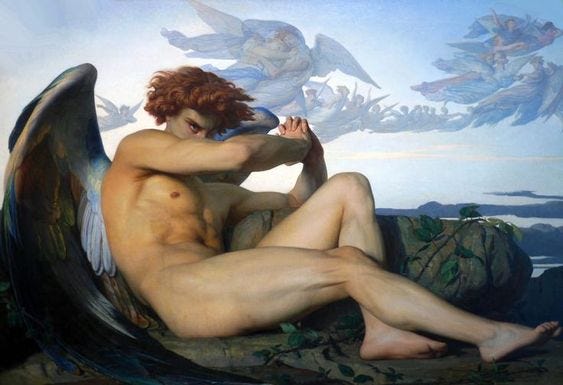Björk, Sappho, Aphrodite & the Devil
Phenomenologies of heartbreak & lovers reunited
Björk steps down from the altar of the Riverside Church. She is barefoot, clad in a black beaded dress shaped like a swan, treading a heel-heavy march down the stone aisle. Pulsing behind her is the bass of her song “Unravel,” designed to sound like a beating heart, and she begins to march. The room is full of spectators but all is dark, save for a spotlight trained on her as she sings, chest and chin forward, eyes gleaming heroic.
While you are away
My heart comes undone
Slowly unravels
In a ball of yarn…
She is stepping forward, singing to the church ceiling. All else has frozen—nothing else exists save for the singer, expressing the anguish of being separated from her love.
…The Devil collects it
With a grin
Our love
In a ball of yarn—
he’ll never return it…
The Devil has interfered here, and of course is the reason two lovers would be separated—only the intervention of something sinister would keep the two apart. Björk here is a lamenting warrior of love, a mouthpiece of Venus, who urges reunification.
So when you come back
We’ll have to make new love
(He’ll never return it)
So when you come back
We’ll have to make new love.
Two thousand years ago or more, in ancient Greece, Sappho was having a similar problem, as she watched with anguish as her lover was approached by a man at a party. To see the object of her affections admired by someone else causes a near heart explosion. Here Sappho renders a phenomenology of anxious love.
That man looks like a god
Who sits watching you as
You mold your pretty words
Your charming laughter, it
Makes electric my heart in
My breast; it’s a desire that
Terrifies me, binds me breaks
My tongue in half, and so
I shiver and wildfire races
Beneath my skin…
I see the scene as clearly as any movie: Sappho worried and weary, casting heavy glances over to her lover as she’s charmed and chatted up by a stranger, a man who seeks to win her affections.
Sappho’s doomy glances are as bright as Björk’s church aisle spotlight, and both moments, though enacted thousands of years apart, express a special, eternal, kind of grief. No one wants to be separated from their lover only to see them approached by another at a party—or anywhere for that matter. The angst rings true from ancient Greece to today.
Björk strode down her church aisle, and her song was anguished but brave. To be separated from her love causes the unspooling of her heart. For Sappho, things are a bit more dire; her whole body is overtaken by a clammy panic, heartbeat in the ears and all.
I shiver and wildfire races
Beneath my skin, my sight
Darkens, blood drums in
My ears: look at me I am
Drenched in sweat, I lose
Color and I am paler than pale grass…
To be kept separate, divided by fate or bad luck or circumstance from our beloveds causes a disintegration of the heart, of the whole body. We fall apart in slow motion. For Björk it is the slow unwinding of the threads of love, stolen by the Devil and kept for eternity in his dark realms. Love is lost due to time spent apart.
For Sappho, it is the intervention of a man who “looks like a god,” an oppositional mirroring of Björk’s adversary, the Devil. Regardless, god or demon, the message is clear: something supra-human intervenes between lovers, threatening to change the path of fate.
At the edges of love, death lingers. Björk’s Devil is a harbinger of demise, the King of Hell, the fallen angel. Sappho, too, feels death nearby:
You know it is
Clear, death is close
To me.
In each archetype lies its opposite, lurking, looking to remind us of the necessary tension between all things. To love deeply is to make one’s heart vulnerable to loss, to the pain of separation. Love always contains the threat of death. Even Psyche and Eros couldn’t keep themselves safe from jealous eyes and malicious enemies.
Love is an affirmation of life, and so death always hovers at love’s lips. Remember, we know Lucifer as the fallen angel who becomes the Devil. But his name means “light-bringer,” and the Romans called the planet Venus “Lucifer” when she was visible as a bright morning star. The enfoldment of beauty and damnation is as old as the ancient sky.
To love is an act of valiance, and Björk in her slow march is brave as a knight of Venus, swan-bead dress as her chainmail, voice as sword, ready to call out to the devil, to banish the evil that has caused her heart’s unraveling. Sappho too is an emissary of Venus, speaking to Aphrodite in most of her poetry, always calling out to her when her heart is breaking, and often, Aphrodite answers. The call and response here shows a reciprocity between poet and god. Poets are meant to be channels of the gods, after all. This is a hallmark of the lyric mode, which both Björk and Sappho are masters of.
Though both Björk and Sappho have been unraveled, undone, made ill and disoriented by the interference of gods and devils, they both make a bid for reunification, as Venus, the goddess of love and harmony, seems to pulse through their veins. Björk ends her march singing, “So when you come back, / We’ll have to make new love.” Sappho, steeling herself after her near death experience simply states, “Yet I must dare / . . as one so poor. .” and we imagine her chasing after her lover, pulling her away from that godlike interloper.
What weaves hearts back together, and undoes the threat of heartbreak, is but a simple gesture. The act of making new love can spin back the yarn of Björk’s heart, just as the act of daring to reach out to the lover can bring her back to Sappho’s arms. Love takes us to the brink of loss, but in reaching for unity, we can melt hearts together again, nestle them entwined and tangled, as they should be.
watch Björk’s Unravel performance here
Sappho fragment 31 in full (translation mine)
31
That man looks like a god
who sits watching you as
you mold your pretty words
your charming laughter, it
makes electric my heart in
my breast; it’s a desire that
terrifies me, binds me breaks
my tongue in half, and so
I shiver and wildfire races
beneath my skin, my sight
darkens, blood drums in
my ears: look at me I am
drenched in sweat, I lose
color and I am paler than
pale grass, you know it is
clear, death is close
to me. Yet I must dare
. . as one so poor. .








i think björk is like a triple scorpio, no? (her big three are all in scorpio) that song 'hunter' also felt like the perfect encapsulation of the scorpio moon i share with her.
Wait a second, did you translate the Sappho fragment from Greek?! That’s amazing! A multitalented queen 👑